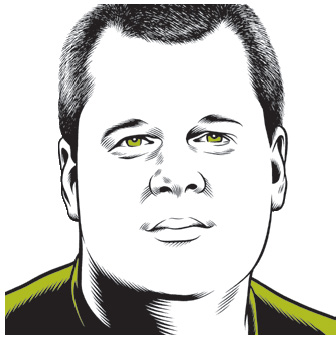- LAUREATE: Romain Rolland (France, 1915)
- BOOK READ: Jean-Christophe, translated by Gilbert Cannan
This great brick of a book—somewhere in the 1,500-page range, if you pick up the three-books-stuffed-into-one Modern Library edition—is the sort of book that makes people say that people don’t write this sort of book anymore. It’s not generally said nostalgically. More than once, when spotting me lugging Jean-Christophe around, friends said, “What is that?” like it was a giant bug on my shoulder. When I explained, “It’s a ten-volume novel about a man modeled after Beethoven, written by the 1915 winner of the Nobel Prize,” they’d take it from me and flip through it for a second. Then, returning it, they’d say, “They don’t write books like that anymore,” and although they never added, “thank god,” it was clearly implied. Nowadays people don’t want to sit and visit with the same characters, wrestling with the same themes, over and over again, for a very long time. They’re busy watching all five seasons of The Wire. (They don’t make shows like that anymore.)
It’s true that Jean-Christophe contains several characteristics one might call old-fashioned. The book’s second paragraph—if you don’t include the first chapter’s epigram in untranslated Italian—announces the birth of a baby; I stopped there and checked the back of the book, where I found the soul entering the afterlife. Between the cradle and the grave, the book gives us not only the life of a man but the lives of people who know him, and the lives of a few of the people who know people who know him. This means that a section ends with “But as it turned out, she began to confide in him that night, and told him all her life from her childhood on,” and the next begins “A sad childhood!” and goes from there.
But Jean-Christophe is no Dickensian sprawling tapestry of humanity, nor a multigenerational saga in which key historical events are spliced into the proceedings, nor is it one of those novels where people sit around debating the meaning of art. The novel is flavored with all of these scenarios, but while it offers life’s banquet, it’s a little difficult to see which dishes are the speciality of the house. The title character is a composer—maybe you guessed that after the Beethoven thing—but Rolland is so busy observing his hero’s life and recording his thoughts that he seems to forget the composing thing, and shoehorns it in at the last minute:
Like the Apostle Paul,—in Raphael’s picture,—silent and dreaming, leaning on his sword, he is beyond exasperation, and has no thought of...
You have reached your article limit
Sign up for a digital subscription and continue reading all new issues, plus our entire archives, for just $1.50/month.
Already a subscriber? Sign in





